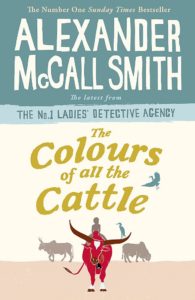The back cover of The Colours of All the Cattle calls this book, the nineteenth in the No. 1 Ladies’ Detective Agency series, “the one with the election.” Indeed, a special election for a seat on the Gabarone city council dominates the stories told in The Colours of All the Cattle. The council is closely divided about a proposal to build Big Fun Hotel on some land next to a cemetery. Many people are unhappy about the implied disrespect of a boisterous resort near where people go to visit their dearly departed, but it looks like big money is involved and the fix is in. But Mma Potokwani, the formidable matron of the orphan farm, knows that a vacancy is coming up because a council member is ill and will resign before his term is complete.
She looked intently at Mma Ramotswe. ‘And that means that there will be an election for that seat, and a new member.’
‘I suppose so,’ said Mma Ramotswe.
Mma Potokwani lowered her voice again — almost to a whisper. ‘And that also means, Mma, that some good person — some person who might be a woman this time — could stand for that seat.’
It took a few moments for Mma Ramotswe to respond. The, eyes wide with surprise, she said, ‘You, Mma?’
Mma Potokwani smiled. ‘No, Mma. You.’ (pp. 22–23)
The titles of the chapters that follow give a sense of Mma Ramotswe’s enthusiasm for campaigning: “I Am Not the Right Person” or “Sign Here, Please, and Here…” To add to Mma Potokwani’s powers of persuasion, the filing deadline is just a few days away, and only one other candidate has submitted the papers necessary to get on the ballot: Violet Sephotho, the closest that the series has to a recurring villain.
The set-up is contrived, but it provides McCall Smith with opportunities for lovely set pieces with his characters. Mma Makutsi, for example, practically bursts when she finds out who Mma Ramotswe’s opponent will be, and pens a manifesto that spends a couple of paragraphs on her virtues and several pages lovingly detailing all of Violet Sephoto’s shortcomings and mean deeds. More seriously, Mma Ramotswe and other characters reflect on public good versus private profit, and what small-time individuals can do to prevent the latter from overwhelming the former. For her election poster, she chooses the words, “I am Mma Ramotswe. I am not much, but I promise you I’ll do my best.” (p. 178) The contrast with the flashy, up-and-coming, on-the-move Violet Sephoto could not be clearer.
Late in the campaign, Mma Ramotswe speaks with a journalist, in an interview that would drive political operatives to despair. “Finally, the journalist said, ‘Do you think you will win, Mma?’ Mma Ramotswe thought for a moment, and then answered, ‘No.'” (p. 178) Fortunately for her chances, it appears under the headline, “An Honest Woman Speaks” with a subhead clearly stating her opposition to the Big Fun Hotel.
Although the election drives the book, detection does not stop at the No. 1 Ladies’ Detective Agency. They have what appears a nearly hopeless case. A respected doctor who practiced in the area where Mma Ramotswe grew up back when she was a girl has been injured by a hit-and-run driver. The only information that he can offer is that the car was blue. The police found that too little to go on, so Dr Marang and his daughter have turned to Mma Ramotswe and her colleagues. Charlie, the irrepressible apprentice mechanic and assistant detective, says he knows another mechanic up that way who might be helpful.
Charlie’s story also gets more interesting, in a way that’s not nearly as contrived as the election storyline. His wandering eye has settled on a nice and independent woman known by the nickname Queenie-Queenie. She works at a fashionable boutique downtown, and Charlie scrapes together a few spare pula to be able to invite her to coffee and conversation. He really likes her, but he is worried that his precarious financial situation will prevent him from showing her the good time he presumes she wants. And that’s before factoring in her protective body-builder brother. Queenie-Queenie comes from a wealthy family but wants to be known for herself and prefers men of character to flashy gents. Will their expectations prevent romance?
Despite the contrived setup of the main story, The Colours of All the Cattle has everything I hope for when I turn to a No. 1 Ladies’ Detective Agency book, including characters showing new aspects of themselves, despite how familiar they are. The twentieth book in the set is probably not the best place to start, but it is a fine way to continue.


2 comments
1 ping
Yay, welcome back! Wanted to check tho that you deliberately back dated this post tho, because I was surprised to not see it at the top when I came to the main page!
Author
Thanks! It’s good to be back!
And yes, a bit of a retcon to be closer to when I finished it.
[…] assistant with the detective agency. Long a ne’er-do-well in the series, Charlie found someone in The Colours of All the Cattle, and McCall Smith shows more of the hurdles that their different backgrounds produce, along with […]